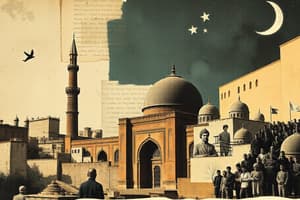Podcast
Questions and Answers
What is the primary directive conveyed through Al-Anfal: 20 regarding the Messenger?
What is the primary directive conveyed through Al-Anfal: 20 regarding the Messenger?
- To obey the Messenger upon understanding his message. (correct)
- To obey the Messenger only when convenient.
- To question the Messenger's instructions critically.
- To selectively obey the Messenger based on personal preferences.
Besides 'obey,' which other commands are found in the Quran related to the Messenger?
Besides 'obey,' which other commands are found in the Quran related to the Messenger?
- To ignore the Messenger
- To follow the Messenger (correct)
- To judge the Messenger
- To debate with the Messenger
According to the Quran, what is the comprehensive expectation regarding the Messenger for believers?
According to the Quran, what is the comprehensive expectation regarding the Messenger for believers?
- Partial compliance with the Messenger's teachings.
- Total obedience, adherence, and reference to the Messenger. (correct)
- Conditional obedience to the Messenger based on personal understanding.
- Selective adherence to the Messenger's commands based on social norms.
If a believer is unsure about a specific teaching of the Messenger, what is the most appropriate course of action based on Quranic verses?
If a believer is unsure about a specific teaching of the Messenger, what is the most appropriate course of action based on Quranic verses?
Why does the Quran use multiple verbs (e.g., obey, follow, turn to) when addressing the believers' relationship with the Messenger?
Why does the Quran use multiple verbs (e.g., obey, follow, turn to) when addressing the believers' relationship with the Messenger?
Which of the following characteristics is considered a shared attribute of the first four rightly guided caliphs?
Which of the following characteristics is considered a shared attribute of the first four rightly guided caliphs?
What is one significant aspect of the first four caliphs, according to the content?
What is one significant aspect of the first four caliphs, according to the content?
According to the content, what distinguishes the first four caliphs from other companions of the Prophet Muhammad (SWS)?
According to the content, what distinguishes the first four caliphs from other companions of the Prophet Muhammad (SWS)?
What is the most accurate description of the role of the 'rightly guided caliphs'?
What is the most accurate description of the role of the 'rightly guided caliphs'?
What can be inferred from the mention of their views on the Sunnah concerning the rightly guided caliphs?
What can be inferred from the mention of their views on the Sunnah concerning the rightly guided caliphs?
According to the passage, what is the primary characteristic of a true follower of the Messenger?
According to the passage, what is the primary characteristic of a true follower of the Messenger?
What obligation does the passage emphasize for Muslims?
What obligation does the passage emphasize for Muslims?
How does the passage suggest a Muslim should demonstrate their faith?
How does the passage suggest a Muslim should demonstrate their faith?
What is meant by 'the Last Day', in the context of the passage?
What is meant by 'the Last Day', in the context of the passage?
What underlying assumption is made in the passage about the Prophet's commandments?
What underlying assumption is made in the passage about the Prophet's commandments?
According to the provided information, why is the Prophet Muhammad's (pbuh) life considered a moral example for Muslims?
According to the provided information, why is the Prophet Muhammad's (pbuh) life considered a moral example for Muslims?
What is the significance of the phrase 'sun rasool-o-Ulla' ( )سن رسول هللاused by the Shaba?
What is the significance of the phrase 'sun rasool-o-Ulla' ( )سن رسول هللاused by the Shaba?
When the Shaba used the phrase 'hadiisna rasool-u-llah' ()حدثنا رسول هللا, what were they emphasizing about their knowledge?
When the Shaba used the phrase 'hadiisna rasool-u-llah' ()حدثنا رسول هللا, what were they emphasizing about their knowledge?
What does the reference to 'the Last Day' in relation to the Prophet's (pbuh) example suggest about its relevance?
What does the reference to 'the Last Day' in relation to the Prophet's (pbuh) example suggest about its relevance?
How might a Muslim utilize the Prophet's (pbuh) example in their daily life, based on the content?
How might a Muslim utilize the Prophet's (pbuh) example in their daily life, based on the content?
What is the key difference between 'sun rasool-o-Ulla' ( )سن رسول هللاand 'hadiisna rasool-u-llah' ()حدثنا رسول هللا?
What is the key difference between 'sun rasool-o-Ulla' ( )سن رسول هللاand 'hadiisna rasool-u-llah' ()حدثنا رسول هللا?
What is the significance of the Prophet's (pbuh) 'social interactions' being considered examples of moral conduct?
What is the significance of the Prophet's (pbuh) 'social interactions' being considered examples of moral conduct?
Why is it important to understand the phrases 'sun rasool-o-Ulla' ( )سن رسول هللاand 'hadiisna rasool-u-llah' ()حدثنا رسول هللا in the context of hadith?
Why is it important to understand the phrases 'sun rasool-o-Ulla' ( )سن رسول هللاand 'hadiisna rasool-u-llah' ()حدثنا رسول هللا in the context of hadith?
How does the concept of 'revelation' relate to the Prophet's (pbuh) moral example, according to the text?
How does the concept of 'revelation' relate to the Prophet's (pbuh) moral example, according to the text?
If a hadith uses the phrase 'hadiisna rasool-u-llah' ()حدثنا رسول هللا, what can be inferred about the Shaba who narrated it?
If a hadith uses the phrase 'hadiisna rasool-u-llah' ()حدثنا رسول هللا, what can be inferred about the Shaba who narrated it?
What is the significance of Prophet Muhammad's (PBUH) silence regarding an action in Hadith-e-taqriri?
What is the significance of Prophet Muhammad's (PBUH) silence regarding an action in Hadith-e-taqriri?
How does Hadith-e-taqriri contribute to the understanding of Islamic jurisprudence?
How does Hadith-e-taqriri contribute to the understanding of Islamic jurisprudence?
In the context of Hadith-e-taqriri, what condition must be met for the Prophet's (PBUH) silence to be considered significant?
In the context of Hadith-e-taqriri, what condition must be met for the Prophet's (PBUH) silence to be considered significant?
A person performed an action in the presence of Prophet Muhammad (PBUH), and the Prophet neither approved nor disapproved. How is this scenario classified?
A person performed an action in the presence of Prophet Muhammad (PBUH), and the Prophet neither approved nor disapproved. How is this scenario classified?
What is the most accurate definition of Hadith-e-Taqriri?
What is the most accurate definition of Hadith-e-Taqriri?
Flashcards
Who are the Shaba?
Who are the Shaba?
Companions of the Prophet Muhammad (peace be upon him).
What does 'sun rasool-o-Ulla' mean?
What does 'sun rasool-o-Ulla' mean?
The phrase 'sun rasool-o-Ulla' means 'the prophet (saw) has showed us the way'.
What does 'hadiisna rasool-u-llah' mean?
What does 'hadiisna rasool-u-llah' mean?
The phrase 'hadiisna rasool-u-llah' means 'the prophet (saw) defined for us'.
Why did the Shaba quote the Prophet?
Why did the Shaba quote the Prophet?
Signup and view all the flashcards
What did the Shaba gain from the prophet
What did the Shaba gain from the prophet
Signup and view all the flashcards
Verse Al-Anfal: 20 obligation
Verse Al-Anfal: 20 obligation
Signup and view all the flashcards
Quranic commands about the Messenger
Quranic commands about the Messenger
Signup and view all the flashcards
Allah's commands related to the Messenger
Allah's commands related to the Messenger
Signup and view all the flashcards
Action upon hearing the message
Action upon hearing the message
Signup and view all the flashcards
Believers' duty towards the Messenger
Believers' duty towards the Messenger
Signup and view all the flashcards
Who are the 'Rightly Guided Khalifas'?
Who are the 'Rightly Guided Khalifas'?
Signup and view all the flashcards
Name the first four Khalifas.
Name the first four Khalifas.
Signup and view all the flashcards
What 'glad tiding' was given to the 4 Khalifas?
What 'glad tiding' was given to the 4 Khalifas?
Signup and view all the flashcards
Define 'Sunnah'.
Define 'Sunnah'.
Signup and view all the flashcards
What was the 4 Khalifas' view on the Sunnah?
What was the 4 Khalifas' view on the Sunnah?
Signup and view all the flashcards
Following the Messenger
Following the Messenger
Signup and view all the flashcards
Hoping for Allah and the Last Day
Hoping for Allah and the Last Day
Signup and view all the flashcards
Remembering Allah Much
Remembering Allah Much
Signup and view all the flashcards
Commandments of the Prophet
Commandments of the Prophet
Signup and view all the flashcards
The Best Example
The Best Example
Signup and view all the flashcards
Hadith-e-Taqriri
Hadith-e-Taqriri
Signup and view all the flashcards
Prophet's (PBUH) Tacit Approval
Prophet's (PBUH) Tacit Approval
Signup and view all the flashcards
Action/Statement Context
Action/Statement Context
Signup and view all the flashcards
Tacit Approval
Tacit Approval
Signup and view all the flashcards
Source of Islamic Law
Source of Islamic Law
Signup and view all the flashcards
Qur'an 33:36 significance
Qur'an 33:36 significance
Signup and view all the flashcards
Prophet's example
Prophet's example
Signup and view all the flashcards
Source of Prophet's guidance
Source of Prophet's guidance
Signup and view all the flashcards
Following Prophet in society
Following Prophet in society
Signup and view all the flashcards
Timeless example
Timeless example
Signup and view all the flashcards
Study Notes
Sunnah
-
Sunnah means "path", a practice, a custom, or a manner.
-
Before Islam, Arabs used Sunnah with the same meaning.
-
The Quran also uses Sunnah to refer to the manner of Allah.
-
Teachings of the Prophet that are followed are considered Sunnah.
-
Hadith includes anything related to the Prophet.
-
Sunnah refers to actions followed according to the Prophet's manner.
-
Scholar Taymiyyah stated Sunnah's position is confirmed in over 40 places in the Quran.
-
Following the Sunnah is important.
-
Verse [Ale-Imran: 132] indicates Allah's mercy is for those who obey the Messenger
-
Verse [Al-Anfal: 20] an obligation to obey the Messenger
-
The companions of the Prophet are praised for their understanding of the Quran and adherence to the Prophet's commands.
-
The first four rightly guided caliphs (Abu Bakr, Umar, Uthmaan, Ali) are the best companions.
-
The Quran provides clear instructions on Ahkam-e-shariat, but the details require Hadith
-
Actions like praying, performing hajj, and paying zakat are detailed in the Quran, physical demonstration is found in Ahadith.
-
Following the Prophet's teachings is essential to obey the Quran's commands.
-
It is obligatory for Muslims to follow the Prophet and his commandments.
-
Hadith and Sunnah of the Prophet are complete guidance for mankind.
-
An individual who rejects the Sunnah actually has no faith in the holy Quran.
Hadith
-
The word "Hadith" comes from "tehdis," meaning "to give news."
-
Religious scholars consider Hadith as having an advanced meaning, opposite of old; referring to the Quran as old and Hadith as advance.
-
Any saying, act, or habit of the Prophet is called Hadith.
-
The teachings of the Prophet are considered Hadith when being narrated.
-
Hadith types include:
- Hadith-e-quoli: The sayings of the Prophet.
- Hadith-e-faili: The habits of the Prophet that the Shaba learned, including his way of life, worship, and manners.
- Hadith-e-taqriri: Work a person did before the Prophet and the Prophet was told about it but he disliked it and remained silent and silence is considered agreement.
-
Prophet Muhammad said he left two things: the Quran and Sunnah.
-
Muslims will never go astray as long as they hold fast to them.
-
Ayaat are clear commands to "obey messenger," easily understood.
-
Obeying the Messenger is obeying Allah [Qur'an 4:80].
-
Allah instructs believers to offer salaah (formal prayers) and pay zakaah (obligatory charity) [Chapter 2, verse 43].
-
The Prophet clarified how to perform salaah and zakaah, instructing followers to "Pray as you saw me pray."
-
Hadith are essential for law courts in an Islamic state.
-
Judging disputes was a primary duty of the Prophet, based on revelation.
-
A primary source of principles carried out in an Islamic State is the judgments.
-
The Prophet's character and social interactions serve as examples of moral conduct for Muslims.
-
Without Hadith, there is no Islam.
-
Allah addresses Rasulullah to clarify the Quraan to the people.
-
Allah wanted the Quraan to be concise and easy to memorize with finer details left to Rasulullah.
-
The most important injunction in Shariah is Salaah and the Hadith is by Rasulullah.
-
The Prophet said, "Salaah is the most important pillar of Islam and if you establish Salaah, you will establish the rest of Deen."
-
Finer details about fasting, zakaah, Salaah, and Azaan are received from Rasulullah.
-
Without Hadith Islam does not exist.
-
Every hadith is composed of two components: Matn and Sanad.
-
Matn is the actual wording of the Hadith text.
-
Sanad is the chronological list of people who transmitted the Matn.
-
Sanad (narration chain) consists of narrators.
-
Rawi is a single narrator among reporters.
-
Riwayah is the Narration of Rawi.
Studying That Suits You
Use AI to generate personalized quizzes and flashcards to suit your learning preferences.




